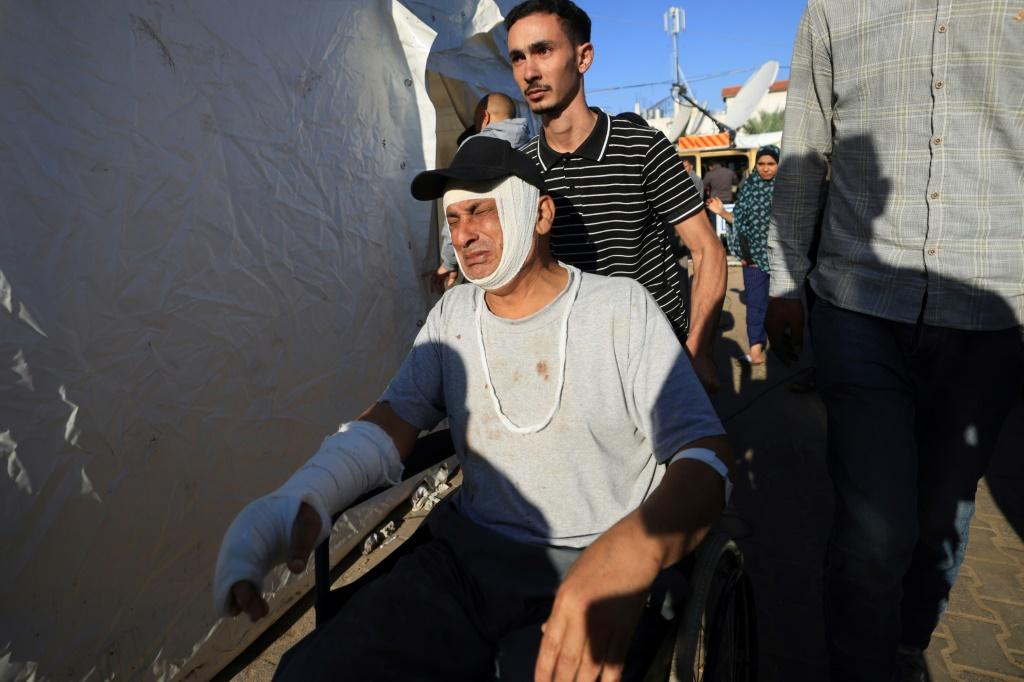
Image: news.com.au
In the midst of the ongoing conflict between Israel and Hamas, the situation at Gaza’s main hospital, Al-Shifa, has taken a dramatic turn. The director of the hospital reported that Israel’s army had ordered the evacuation of over 2,000 patients, medics, and displaced individuals who found themselves trapped in the crossfire of the war.
The evacuation, which took place on foot, saw columns of sick and injured people, including amputees, making their way towards the seafront. The perilous journey was marked by the sounds of explosions around the hospital, and an AFP journalist reported encountering at least 15 bodies along the route, some in advanced stages of decomposition. The chaotic scene unfolded without the aid of ambulances, as Israeli drones buzzed overhead.
The Hamas-run health ministry stated that 120 wounded individuals, along with premature babies, remained at Al-Shifa hospital, which has become a focal point in the seven-week war triggered by Hamas’s attacks on Israel. Israel, on the other hand, has been conducting military operations within the hospital, claiming to be searching for a Hamas operations center allegedly located beneath the complex. This charge is vehemently denied by Hamas.
Israel, having vowed to destroy Hamas in response to the October 7 attacks, has faced international scrutiny for the high civilian toll, with Israeli officials reporting about 1,200 casualties, most of them civilians in southern Israel. The conflict, characterized by relentless air and ground campaigns, has reportedly claimed the lives of 12,000 people, including 5,000 children, according to the Hamas government.
In Gaza City, Israeli troops ordered the evacuation of Al-Shifa hospital through loudspeakers, a move that the army later denied, asserting that it had acceded to the hospital director’s request to facilitate the evacuation of additional Gazans who wished to leave.
The broader context of the conflict paints a dire picture for civilians in Gaza. Israel has urged Palestinians to move from the north for safety, but airstrikes continue to hit central and southern areas. The blockade imposed by Israel on Gaza has limited the flow of aid, raising concerns about a potential humanitarian crisis. Reports indicate that over 1.6 million people in Gaza have been internally displaced, and more than half of the hospitals are no longer functional due to combat, damage, or shortages.
The situation is further exacerbated by fuel shortages, causing a two-day blackout that ended only when the first fuel delivery arrived from Egypt. The United Nations has warned that no part of Gaza is safe, with 70 percent of residents lacking access to clean water in the south, where raw sewage has started to flow in the streets.
As international pressure mounts for a ceasefire, the United Nations agency for Palestinian refugees (UNRWA) continues to plead for humanitarian assistance. Israel’s recent decision to allow a limited daily supply of fuel from Egypt may alleviate some challenges, but concerns persist about meeting the minimum requirements for hospitals, water, and sanitation facilities.
In the latest tragic incident, a residential building in the southern city of Hamad was struck, resulting in the death of 26 people. The director of Nasser hospital in Khan Yunis recounted a horrifying scene of multiple bombs being dropped, with human remains scattered and survivors desperately seeking help.
The conflict’s toll extends beyond the immediate violence, with reports of hostages, ongoing negotiations for their release, and the discovery of bodies near the hospital complex. Amidst this turmoil, thousands of people, waving Israeli flags and demanding the release of hostages, marched towards Jerusalem on the fifth and final day of a protest.
The situation in Gaza remains critical, with civilians caught in the crossfire and facing multiple humanitarian challenges. International efforts are needed to address the immediate needs of the population and to work towards a lasting resolution to the conflict.
